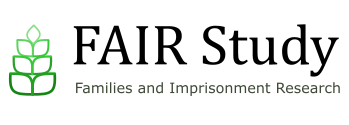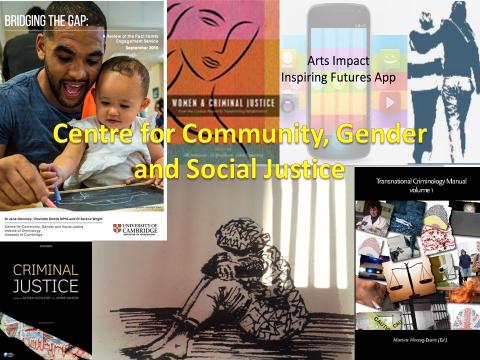FAIR Study Conference Abstracts from 2018
In 2018, the FAIR Study team presented their early findings at two international conferences. You can read a summary of these presentations below. If you wish to know anymore about any of the presentations please contact us on fair@hermes.cam.ac.uk

European Society of Criminology Annual Conference 2018: Sarajevo.
Imprisonment, Family Stability and Change – Towards an Understanding of Resilience Processes in Families who have experienced Parental Imprisonment.
Lanskey, C., Lösel, F., Markson, L, . Ellis, S, Barton-Crosby, University of Cambridge
This paper offers reflections on paternal imprisonment and stability and change in prisoners’ families over time. It discusses early findings from the ESRC funded Families and Imprisonment Research (FAIR) study on changes to family structures and relationships of 51 families in England who experienced paternal imprisonment. This prospective longitudinal research study builds on findings from the project ‘Risk and Protective Factors in the Resettlement of Imprisoned Fathers with their Families.’ This earlier project collected two waves of data, once during and once shortly after the father’s prison sentence. The present study is collecting a third wave of data from the families some seven years after the father was released from prison. Current data indicate that over this time the majority of family groupings have changed and approximately 22% of fathers have been back in prison. Drawing on quantitative descriptive data and qualitative case study data, this paper reflects on reasons for stability and change in prisoners’ families’ structures and relationships including the experiences of contact with the criminal justice system, domestic violence, and substance addiction. It considers the contribution of these early findings to understanding resilience processes in (ex)prisoners’ families including supporting the father’s desistance from crime.
Transience and transition: Retaining participants in the Families and Imprisonment Research study. What lessons can be learned?
Ellis, S, Lanskey, C., Barton-Crosby, J. Markson, L. Losel, F. University of Cambridge
This paper reviews the challenges of longitudinal research with families affected by paternal imprisonment. It describes lessons learned and strategies adopted in the Families and Imprisonment Research (FAIR) study; the first study in Europe to collect multiple waves of data from individual (ex)prisoners, their partners and children. It aims to 1) enhance longitudinal research with prisoners’ families by highlighting specific challenges and solutions, 2) discuss the unique challenges of sampling family sets and 3) consider challenges/opportunities for longitudinal research presented by technology. The FAIR study adopts a mixed methods design exploring the impact of paternal imprisonment on resilience-related outcomes for 51 families over three time points in a 7 year period. This paper presents data on retention rates; the success of different recruitment strategies and fieldwork experiences. It gives particular attention to families from ethnic minority groups. Emergent themes are the practicalities of locating participants; the salience of interpersonal communication and relationship building; and ethical decision making regarding tracking and recruitment. Specific strategies for minimising attrition are suggested.

American Society of Criminology Annual Conference 2018: Atlanta.
Time and the reach of penal power: An analysis of the long-term implications of paternal imprisonment for families
Caroline Lanskey, Friedrich Loesel, Lucy Markson, Karen Souza, Sophie Ellis, Jennifer Barton-Crosby, University of Cambridge, UK.
Little is known about the longer term impact of penal power on families after a parent has been released from prison. Building on Lanskey et al’s analysis (2018) of the ‘referred pains of imprisonment’ this paper discusses the long-term consequences for families of fathers who served a prison sentence. It draws on data from the Families and Imprisonment Research (FAIR) study, a prospective longitudinal study of 54 families in England who experienced paternal imprisonment. Samples of the fathers, mothers and children from these families were interviewed once prior to the father’s release from prison, a second time up to six months after his release, and a third time approximately six years’ later. The paper theorises the temporality of penal power in these families’ lives investigating the extent to which it continued to have an impact on individual family members and on the family unit as a whole and how and why it persisted, transformed or dissipated over time.
Examining Relationships between Paternal Incarceration, Family-Processes, and Well-Being from Childhood Through to Adolescence
Jennifer Barton-Crosby, Friedrich Loesel, Lucy Markson, Caroline Lanskey, Sophie Ellis University of Cambridge, UK.
It is well recognised that paternal incarceration contributes to negative psychological, behavioural, and social outcomes for children and adolescents (e.g. Murray et al., 2014). In developing an understanding of the resilience of children who experience adversity (such as paternal incarceration), there is an increasing move towards uncovering context-specific resilience processes that contribute to well-being in childhood and beyond (e.g. Wyman, 2003). In particular, while previously neglected, the influence of family processes (such as parenting quality) on children’s resilience to paternal incarceration is gaining recognition as an important research focus (e.g. Arditti, 2012). Accordingly, in this presentation, we adopt a family-process oriented approach to understanding the dynamic resilience processes that contribute to the well-being of children who experience paternal incarceration. We use data from the longitudinal Fragile Families and Child Well-being study and employ structural equation change models to examine relationships between paternal incarceration, family-processes, and well-being from childhood through to adolescence.
Long-term experiences of addiction for previously imprisoned fathers
Lucy Markson, Caroline Lanskey, Friedrich Loesel, Karen Souza, Sophie Ellis, Jennifer Barton-Crosby, University of Cambridge UK.
Little is known about what makes families of released prisoners resilient. Data from the three-wave prospective longitudinal Families and Imprisonment Research (FAIR) study of families in England are used to explore how families cope in the longer term after imprisonment. Specifically, this presentation focuses on the fathers' experiences of addiction and its implications for family life. Quantitative data show that difficulties with substance use discriminates between fathers who have successfully reunited with their family after release and those who have not. In addition, preliminary qualitative data from the third wave of the study show contrasting experiences of the longer-term consequences of problematic drug use. These findings can contribute to evidence-based concepts of resilience in the context of imprisonment. For example, the overcoming of a drug addiction may be one component of a resilient response to the challenges of imprisonment and resettlement.




